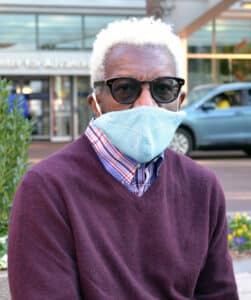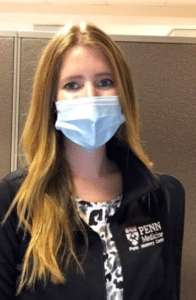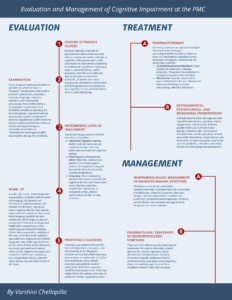by Varshini Chellapilla
Jay Austin was the first study participant to return to the Penn Memory Center after in-person testing was resumed.
Before his visit in July Austin, a participant of the Aging Brain Cohort (ABC) study, had to undergo COVID-19 pre-screening as part of safety protocols. On the day of his appointment, he walked into the Perelman Center for Advanced Medicine, he was greeted by volunteers in masks and personal protection equipment who would check his temperature.
“I think, with all of the safety precautions, I felt really good and very safe and very secure about everything PMC was doing,” Austin said. “Every individual that assists in coordinating the scheduling and conducts the research has just been amazing. So helpful and thoughtful in staying in touch, advising of the process and necessary steps, as well as being available to accompany me throughout my entire time inthe Penn facilities.”
In March, most of the world shut down. As streets emptied and entire countries went into lockdown in an effort to restrict the spread of the novel coronavirus, the doors of the Penn Memory Center closed too.
Researchers, clinicians and social workers moved to work from home and were faced with the challenge of adapting their work to a virtual environment so they could provide necessary resources and services to patients and caregivers.
“I actually haven’t seen the inside of my office since March,” Dr. Largent said. “Although my research hasn’t been severely impacted, it has opened my eyes to new or different research questions. I’ve spent a fair amount this year think about how COVID-19 has affected different populations that Icare about, like older adults, people with dementia, and their care partners.”
The pandemic has seeped into nearly every aspect of life. As clinicians and researchers noticed changes in patients and caregivers, new opportunities for research opened up.
Dr. Emily Largent, RN, JD, PhD, began the COVID Caregiving project —a deep dive into the impact of COVID-19 on caregivers and patients. Dr. Andrew Peterson, a PMC affiliate researcher and assistant professor of philosophy at George Mason University, surveyed over 1,800 Americans about their opinions on potential reallocation of scarce medical resources during the pandemic.
In-patient participation in research studies resumed in July. Every participant is now required to go through COVID pre-screening as well as temperature checks on the day of their appointment. Masks are mandatory at all times. At MRI and PET scans, practices like sanitation time, use of personal protection equipment by clinicians and participants, and social distancing are employed.
Melissa Kelley, a clinical research coordinator, helps coordinate the ABC MRI study.
“Overall, we are making sure to do what we can to make the visit as safe and comfortable for our participants as possible,” Kelley said. “It is our goal to make sure people know that we take their safety seriously.”
Programs and services like the caregiver classes, Shake It Up, and Memory Café were adapted for online platforms. Felicia Greenfield, executive director of PMC; Alison Lynn, associate director of social work; and Cynthia Clyburn, a licensed social worker at Penn Neurology, also created forums for caregivers to share experiences and advice during the pandemic. Additionally, social workers continue to meet with patients, conduct psychotherapy and teach the caregiver class.
“Our heart is breaking every day,” Lynn said. “We see how traumatic this is for patients and caregivers. We see how tired they are, we think they are doing a great job, and we just want to support them. None of us have all the answers and we’re figuring things out as we go. So, thank you for your patience as we figure out how to transition everything online.”
Austin continues to be an active study participant at PMC. He has visited the campus two other times since July and believes that his role in the research is important.
“You know, whether this pandemic is with us for months to come or it goes away forever, the cruelty of dementia and memory loss is horrific,” Austin said. “The only way to develop protocols and medication is for people to stay in these research studies. I would hope that people will continue to participate.”
Click the infographic below to learn more about steps in evaluation, treatment, and management of cognitive impairment during COVID-19 at the Penn Memory Center.


